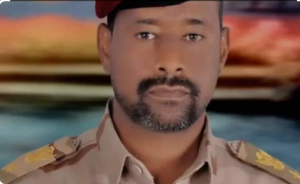Militia Commanders … between Dead, Wounded and Moving away (2-6)

(Musa Garih): His corpse was found preserved in a refrigerator in a house near the Halfaya Bridge
(Ali Yagoub): Came from Chad and worked as a sheep shepherd for the Shartai Suwar and turned into a highwayman
Report: Ali Mansour
Since ancient times, a military commander has borne the responsibilities of fighting, and several factors may combine in the success of the commander and thus the success of his forces in winning battles. In the case of the Rapid Support Forces (RSF) Militia, commanders are not chosen randomly, as they are commanders according to a tribal system, always relying on the elements of his tribe in war and they have tribal influence. So when the militia loses its commanders, it is difficult to replace them. The outlaw RSF lost important commanders in its war against the Sudanese people, some of whom were killed, others were injured, while a third group moved away due to internal disputes as a result of competition over commandership or a feeling of marginalization and greed for spoils at other times, which caused a weakening of the grip and control over the members of the militia, which turned into armed robbery gangs, whose concern is (Shafshafa), which is a term that is considered one of the secretions of this war.
Through this report, we discuss in a series of models of these commanders, focusing on their influence and backgrounds about their biographies.
Ali Yaqoub Jibril
One might ask who is Ali Yaqoub, whose death everyone knew about it. The man came from Chad to Sudan in the late eighties of the last century and worked as a shepherd for the sheep of the Shartai (chieftain) Suwar. In the early nineties of the last century, he turned into a highwayman, particularly on the roads leading from Zalingei to the areas of Dankoug, Garsila, Um Khair, Wadi Salih, and others. In a short time, he became the leader of the most dangerous armed robbery gangs in those areas. Then he joined the Border Guards with the rank of Colonel and quickly promoted to the rank of Major General. He became the third most important man in the Rapid Support Forces. After the death of Mudawi Hussein Dhay-al-Nur, he brough down the state of Central Darfur, and the task of bringing down the city of El-Fashir was assigned to him.
With his death, the outlaw RSF militia lost its most important men, and his death had serious morale effects on the RSF forces.
Wad Al-Nazir Muhammad Mustafa Al-Doud
One of the most important militia commanders who were killed in the battles of the Sahara site in North Darfur at the hands of the joint forces at (Al-Zurq) Axis. He was the son of Al-Nazir (tribal leader) of Al-Mahariya clan, Muhammad Mustafa Al-Doud. When his father received the news of his son’s death, he refused to offer condolences, saying (No condolences before the fall of Al-Fashir). His death represents a strong blow to the tribal militia, given his social and tribal weight and his status as one of the elements of liaise with the external parties. He was also being prepared to inherit the tasks of Ali Yaqoub, who met the same fate earlier.
Musa Garih
His body was found nearly three months after he was killed by an elite group of the armed forces while combing the houses overlooking the Halfaya Bridge from the Khartoum Bahri side. His body was found preserved in a food refrigerator (deep freezer) in one of the houses on the southern side of the bridge for more than (80) days. The Air Force carried out a qualitative operation on April 24, 2023 at the entrance to the Halfaya Bridge, in which it eliminated a convoy of vehicles belonging to the Rapid Support Militia led by Musa Garih, which was on its way to the Garri camp, north of Khartoum Bahri. Brigadier Musa Garih, who held the position of commander of the Rapid Support Militia’s special forces, is considered the right-hand man of the rebel Mohamed Hamdan Dagalo, and the supervisor of providing personal guards for the members of the Central Council for Freedom and Change. He is Hemeidti’s personal friend. He was killed in the first airstrike on Jebel Sarkab. His name is Musa Issa Ahmed Abu Rembail, born in Neyala, grew up in the city of Al-Daien, and graduated in one of the Sufi secs, then practiced charlatanism and sorcery.

